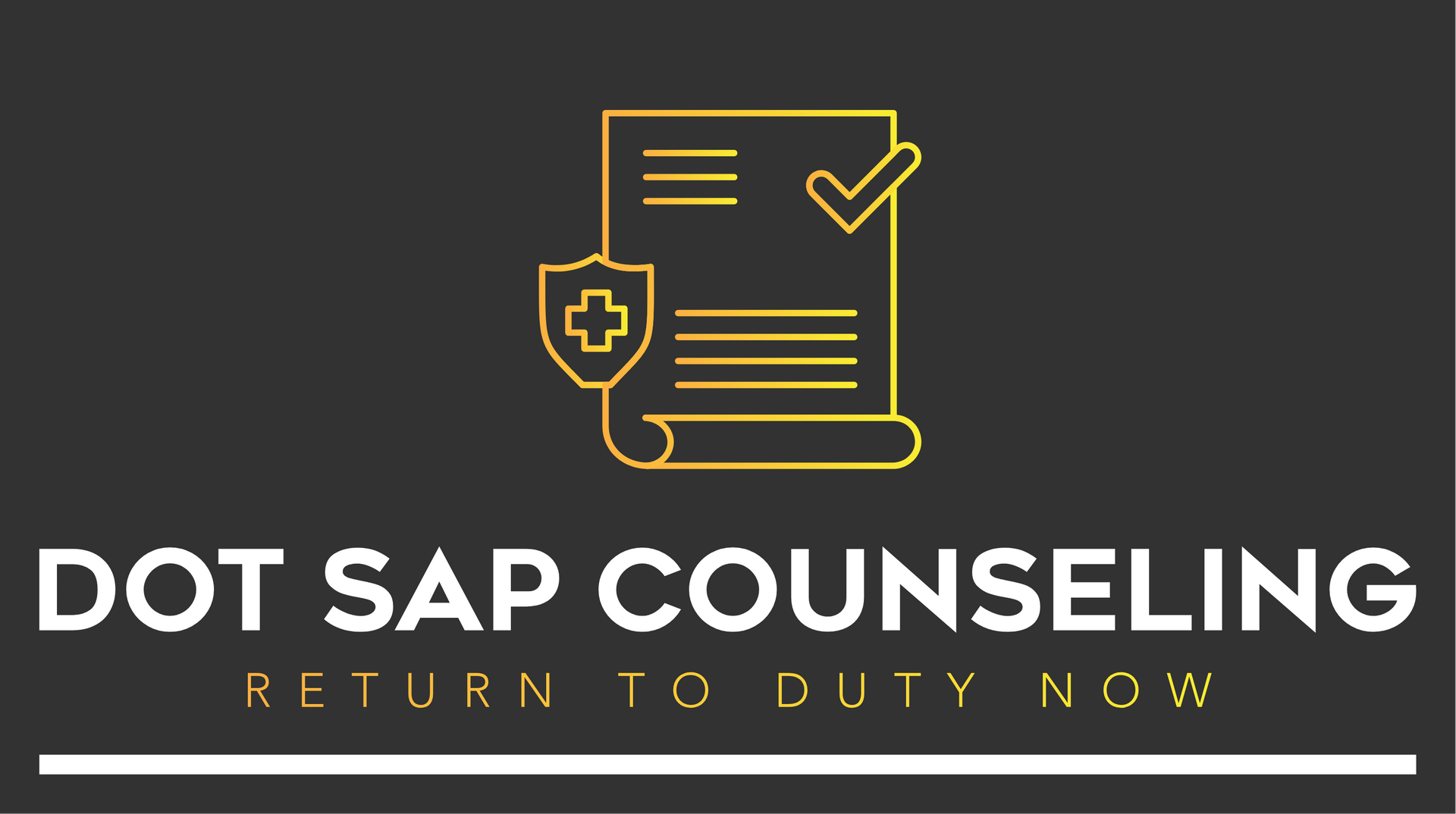DOT SAP Program in California
If you’re a commercial driver in California and you’ve failed a DOT drug or alcohol test, you’re probably wondering what to do next.
The Department of Transportation (DOT) has strict rules—but the good news is, DOT SAP Counseling is compliant and certified with CCAPP (California Consortium of Addiction Programs and Professionals) as well as NAADAC, creating solutions to the Return To Duty process for all California CDL Drug Testing Violations.
Below we will discuss why these compliance points are important, how they ensure that your Return To Duty SAP program completion with DOT SAP Counseling will be accepted by the Department of Transportation and the FMCSA, as well as the consequences for not being compliant.
Who are CCAPP and NAADAC and Why Do They Matter?
CCAPP(California Consortium of Addiction Programs and Professionals) is the largest and longest standing organization representing credentialing and education of addiction counselors in the state of California.
CCAPP is essentially the only certification organization in California that provides the required counselor certifications that meet the standards to become an SAP with NAADAC and also offers one of the educational programs required to become an SAP as well.
NAADAC(National Association for Alcoholism and Drug Abuse Counselors)
represents the professional interests of more than 100,000 addiction counselors, educators and other addiction focused health care professionals in the United States and is the ONLY association that provides the (SAP)Substance Abuse Professional credential to professionals seeking to work with the DOT and FMCSA helping to assist drivers in their Return To Duty process.
Having both certifications from CCAPP and NAADAC, DOT SAP Counseling complies with all regulatory and educational backgrounds to provide services as an SAP.
A DOT-qualified Substance Abuse Professional(SAP) is the only person who can guide you through the official return-to-duty process. They assess your situation, recommend treatment or education, and determine when you’re eligible to test again.
Without going through a SAP, you cannot legally drive in any safety-sensitive role—even if you have a CDL.
Why Completing the SAP Program is Critical
California is one of the busiest trucking hubs in the country, especially with major ports and freight routes running through cities like Los Angeles, San Diego, and Oakland. That means the DOT takes drug and alcohol testing seriously—because public safety is on the line.
Whether you were pulled for a random test, a pre-employment screen, or were tested after an accident, any positive result or refusal to test disqualifies you from operating a commercial vehicle. Ultimately, if you do not complete the SAP program, employers are required by law to refuse to let you operate a commercial vehicle with your CDL. As of November 2024, if you have an SAP violation, your CDL becomes restricted on a DMV level until you complete the SAP program.
If you are caught using your CDL by police and or weigh station officers, you will be issued a ticket, and will be required to show proof of completion on an SAP program within a certain timeframe. If you still do not comply, you will be required to go to court, and a court proceeding will take place potentially revoking your ability to have a CDL at all or worse, depending on the judge's discretion.
The Clearinghouse and Your Record
The FMCSA Clearinghouse is a secure online database that keeps track of drivers who fail or refuse DOT drug and alcohol tests. Once your violation is reported, any employer who checks the database will see that you’re prohibited from driving—until your SAP updates your status to show you’re back in compliance.
That’s why starting the SAP process right away is critical to getting back on the road fast.
DOT SAP Counseling is registered with the FMCSA drug and alcohol clearinghouse, and regularly updates driver clearinghouse portals to reflect their progression through the DOT SAP process; Starting with your designation of a DOT SAP Counseling employee as your official SAP, as well as your completion of the initial assessment and your clearance to take your Return To Duty drug test.
Remote vs. In-Person SAP Services in California
Thanks to telehealth, DOT SAP Counseling now offers virtual evaluations—which is perfect for drivers in remote areas of California, or those with tight schedules. Whether you live in Fresno, Sacramento, or the Inland Empire, you can begin your SAP process from anywhere with a phone or computer.
At DOT SAP Counseling our SAPs are DOT-qualified and have a proven track record with CDL drivers.
DOT SAP Counseling Program Benefits
- Fast initial assessment appointment availability, typically same day and or within 24 hours based on the driver and SAP's schedule.
- Initial consultations about the program and steps to start the program seven days a week, Monday-Sunday.
- Connections with trusted treatment providers.
- Understanding the urgency of getting CDL drivers cleared quickly.
Tips to Speed Up the Process
Want to get back to work as fast as possible? Here are a few things you can do:
- Schedule your SAP evaluation right away. Don’t wait.
- Complete all recommended education/treatment promptly.
- Communicate frequently with your SAP to avoid delays.
- Keep your Clearinghouse login handy so you can check your status.
Final Thoughts: Your CDL Career Isn’t Over
Failing a DOT drug or alcohol test in California doesn’t mean your career is over. It means you need to take the right steps—and the DOT SAP program gives you a clear roadmap back.
With the right guidance, you can protect your CDL, rebuild your reputation, and return to work sooner than you think.
CONTACT US TODAY BY CALLING (949)298-1706 OR SUBMITTING A REQUEST FOR CONSULTATION ON OUR "HOME" OR "CONTACT" PAGE.











